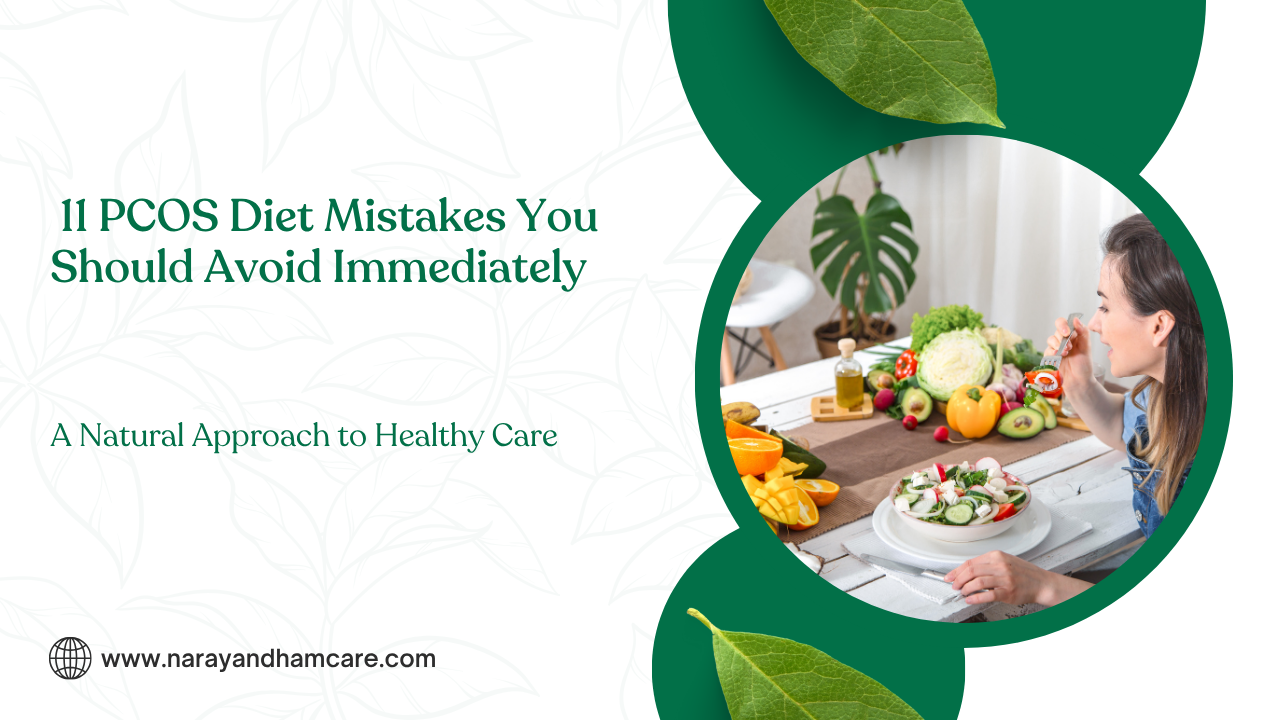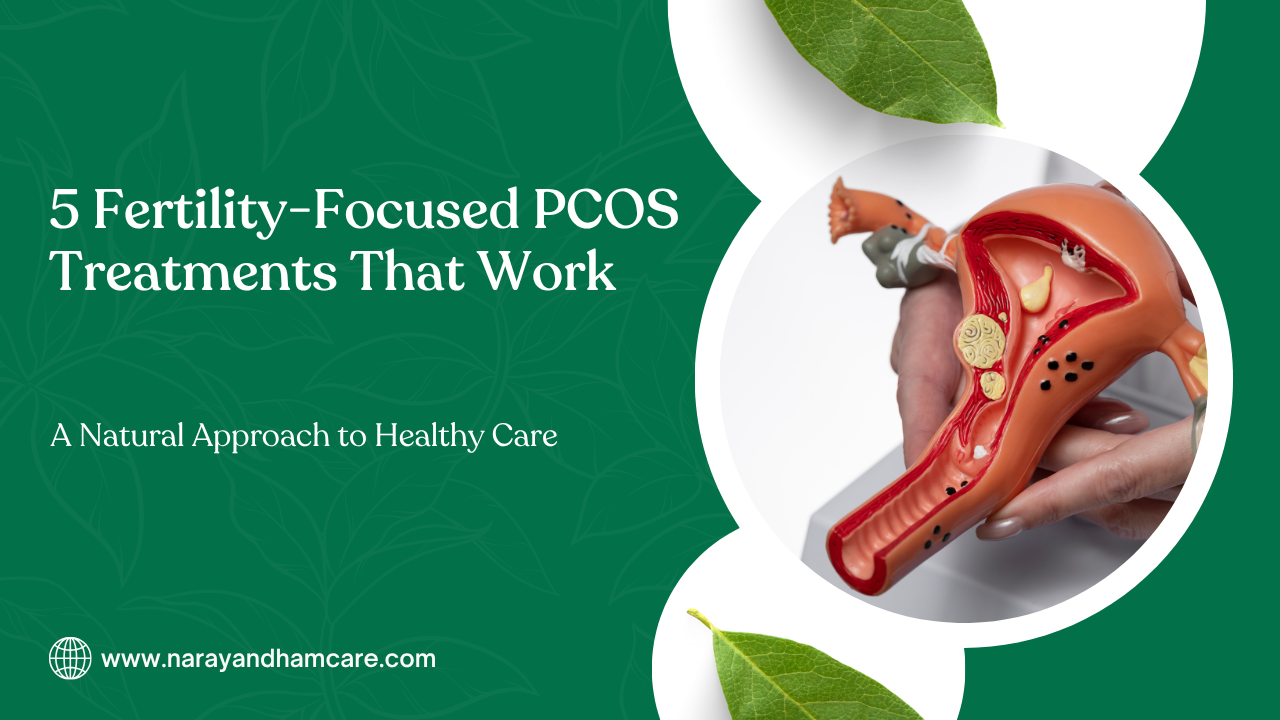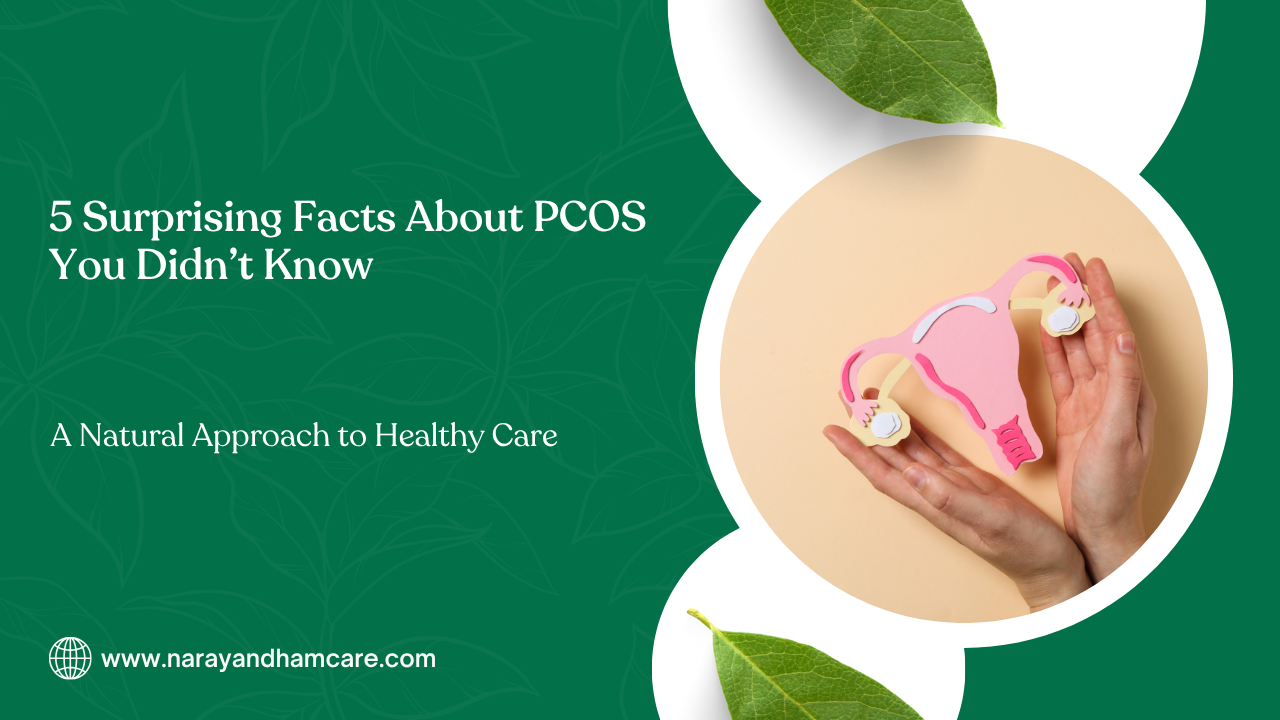PCOS: Introduction
Polycystic Ovary Syndrome, is a health condition that affects many women today. It can lead to irregular periods, weight gain, acne, and even infertility. Diet plays a big role in managing. But many women make mistakes in their food choices without even realizing it.
In this blog, we will talk about 11 common PCOS diet mistakes you should avoid immediately. If you are struggling with PCOS symptoms like belly fat, hair fall, or mood swings, fixing your diet can help. Understanding what not to eat is just as important as knowing what to eat.
This simple guide will help you avoid these mistakes and take the first step toward healing your body naturally.
Problem
Polycystic Ovary Syndrome affects 1 in 10 women of childbearing age. It is a hormone imbalance that causes problems with the ovaries. Women with PCOS may not ovulate regularly, and their insulin levels are often high.
Doctors often suggest weight loss, insulin control, and hormone balance . But without the right diet, it becomes difficult. Many women follow diets that worsen their condition instead of helping it.
Eating the wrong food increases inflammation, insulin resistance, and weight. These worsen symptoms and delay recovery.
Symptoms
How do you know if your getting worse because of diet? Look for these signs:
- Sudden weight gain, especially around the belly
- Irregular or missed periods
- Fatigue or feeling low in energy
- Acne and oily skin
- Hair fall or thinning hair
- Sugar cravings and mood swings
- Difficulty in losing weight despite exercise
- Increased facial hair (hirsutism)
If you have some of these symptoms, your diet may need to change.
11 Common PCOS Diet Mistakes You Should Avoid
1. Eating Too Many Carbs
Refined carbs like white bread, white rice, pasta, and sugary snacks spike your blood sugar. This leads to high insulin levels which worsen.
Tip: Choose whole grains like oats, brown rice, and quinoa.
2. Skipping Meals
Skipping breakfast or going too long without eating can mess up your hormones and increase sugar cravings later in the day.
Tip: Eat small, balanced meals every 3–4 hours.
3. Drinking Sugary Beverages
Sodas, fruit juices, and sweetened coffee/tea add lots of sugar without any nutrition.
Tip: Drink water, herbal teas, or lemon water instead.
4. Consuming Too Much Dairy
Some women with PCOS are sensitive to dairy. It may increase acne and insulin levels in some cases.
Tip: Try switching to almond or oat milk for a while and watch your skin and weight.
5. Not Eating Enough Protein
Protein helps in balancing blood sugar and keeps you full longer. diets are low in protein.
Tip: Add eggs, lentils, beans, tofu, or lean meats to your meals.
6. Overeating Fruits
Fruits are healthy, but too much of high-sugar fruits (like mangoes, bananas, grapes) can spike blood sugar levels.
Tip: Stick to berries, apples, or pears in moderation.
7. Relying on Packaged “Diet” Foods
Many “low-fat” or “diet” snacks are full of sugar and artificial ingredients.
Tip: Choose fresh, whole foods instead of packaged ones.
8. Not Getting Enough Fiber
Fiber helps slow digestion, reduce sugar spikes, and supports weight loss.
Tip: Eat more vegetables, seeds, and whole grains.
9. Eating Large Portions
Even healthy foods can cause weight gain if eaten in large quantities.
Tip: Use smaller plates and learn portion control.
10. Not Drinking Enough Water
Dehydration can worsen cravings and slow metabolism.
Tip: Aim for at least 8–10 glasses of water per day.
11. Ignoring Healthy Fats
Many women avoid fats to lose weight, but good fats are necessary for hormone health.
Tip: Add nuts, seeds, olive oil, and avocados to your meals.
Solution: Build Friendly Diet
Here are simple steps to create a balanced diet :
Step 1: Balance Every Meal
- Protein: Eggs, paneer, lentils, tofu
- Healthy fats: Ghee, avocado, nuts
- Complex carbs: Brown rice, oats
- Fiber: Vegetables, flaxseeds
Step 2: Eat on Time
- Eat breakfast within 1 hour of waking up
- Have meals every 3–4 hours
- Avoid late-night eating
Step 3: Plan Your Snacks
- Roasted chana, nuts, hummus, or cucumber slices
- Avoid chips and biscuits
Step 4: Hydrate Well
- Start your day with warm lemon water
- Carry a water bottle and sip all day
Step 5: Reduce Inflammation
- Avoid fried foods, processed meats, sugar
- Include turmeric, ginger, cinnamon, and green tea
Frequently Asked Questions (FAQ)
Q1: Can PCOS be reversed with diet?
A: Yes, many women manage and even reverse their PCOS symptoms by changing their diet and lifestyle.
Q2: Should I avoid all carbs if I have PCOS?
A: No. Avoid refined carbs, but include healthy carbs like oats, fruits, and brown rice.
Q3: Is dairy bad for all PCOS women?
A: Not always. Some women do well with dairy; others see improvement when they remove it. Try both and see what suits you.
Q4: What is the best time to eat with PCOS?
A: Eat your meals at regular intervals—every 3 to 4 hours—and avoid skipping breakfast.
Q5: Can I eat fruits with PCOS?
A: Yes, but choose low-sugar fruits like berries, apples, and pears. Eat them in moderation.
Conclusion
a lifestyle and hormone condition that responds well to the right diet. Many women make small but harmful food choices every day. Avoiding the 11 common diet mistakes listed here can help balance your hormones, reduce symptoms, and improve fertility.
Healing from takes time—but small, smart changes in your diet can make a big difference. Start with one change at a time, listen to your body, and stay consistent.
Did you find this article helpful? Have you made any of these mistakes? Share your thoughts or questions in the comments below!





